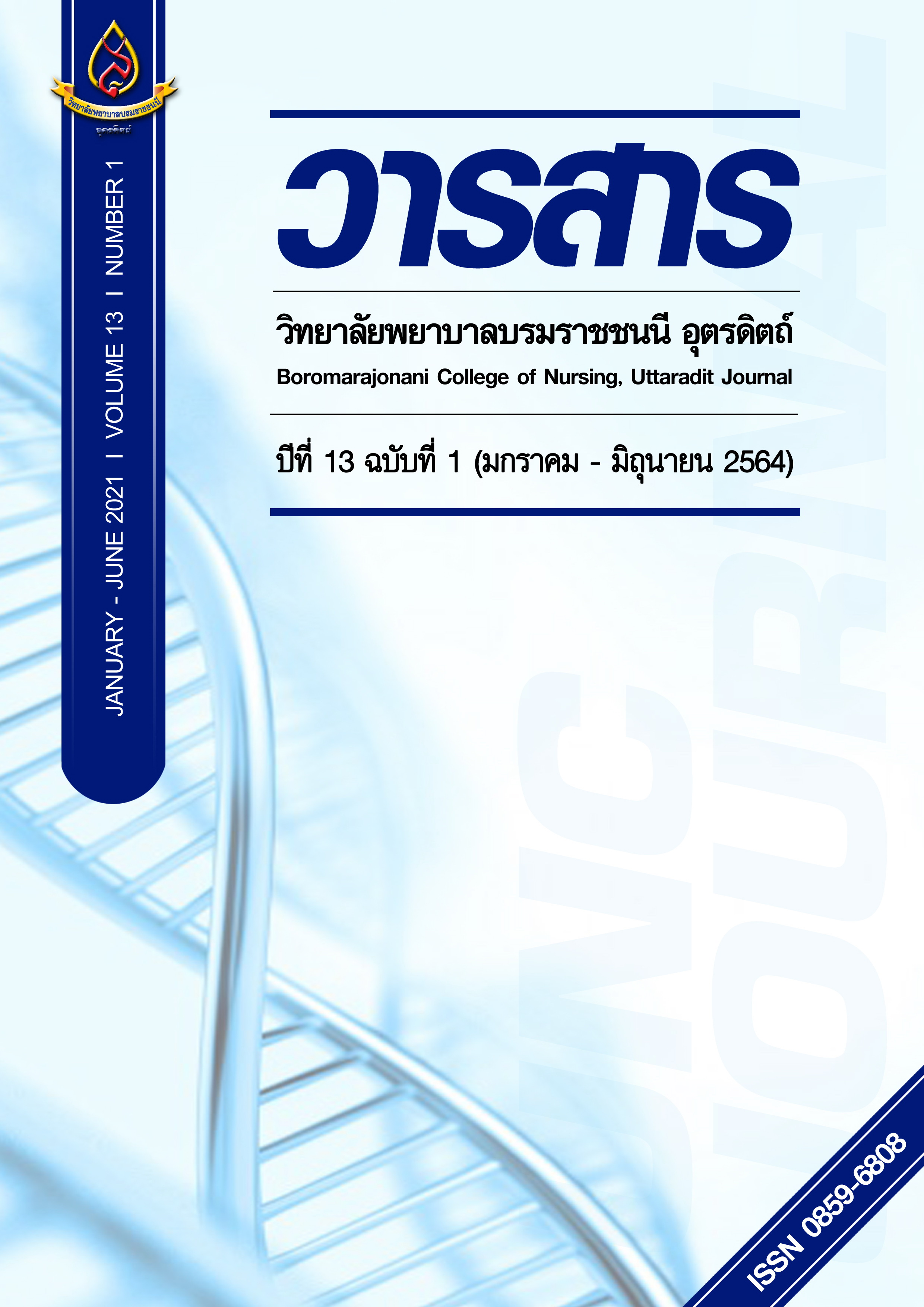Factors Predicting the Nursing Professional Intention of Nursing Students in Colleges of Nursing under the Ministry of Public Health
Main Article Content
บทคัดย่อ
The purposes of this research aimed to study the intention of nursing profession of nursing students, to study the relationship between selected factors and intention of nursing profession, and to study factors predicting the nursing professional intention of nursing students in Colleges of Nursing Under the Ministry of Public Health according to the Theory of Planned Behavior proposed by Ajzen (1991). The sample group used in the research was 457 nursing students from 1st to 4th year derived from multi-stage random sampling. The research instruments were questionnaires consisting of 5 parts: 1) demographic data 2) attitude towards the nursing profession 3) subjective norm about nursing profession 4) perceived behavioral control of nursing profession and 5) nursing professional intention. The overall reliability of the questionnaires by using Cronbach's alpha coefficients was equal to .95. The data were analyzed using mean, standard deviation and multiple regression analysis.
The result revealed as follows;
- Intention in the nursing profession of nursing students when considering the overall level, nursing students had the intention of practicing in the nursing profession at a moderate level (Mean = 3.31 SD. = .66). When considering each year it was found that the third year nursing students had the intention of practicing in the nursing profession at a high level (Mean = 3.57 SD. = .84) while the fourth year, second year, and first year nursing students had the intention to the nursing profession at a moderate level, respectively (Mean= 3.29 SD. = .53, Mean= 3.19 SD =.50 และ Mean= 3.10 SD =.52).
- The relationship between selected factors and intention of nursing profession revealed that the attitude towards nursing profession, subjective norm about nursing profession, and perceived behavioral control of nursing profession had a positive correlation with intention of nursing profession with statistical significance at .01 level with correlation coefficient between .128 and .674.
- Factors predicting the nursing professional intention of nursing students by stepwise multiple regression analysis it was found that the perceived behavioral control of nursing profession mostly affecting the intention of nursing profession in the form of standardized score equal to .479, attitude towards nursing profession and subjective norm about nursing profession affecting the intention of nursing profession in the form of standard score equal to .330 and - .170, respectively. Moreover, it can explain the variance of nursing professional intention of nursing students at 52.10 percent with statistical significance at the level of .01 (R2 = .521, p <.01).
Article Details
บทความหรือข้อคิดเห็นใดใดที่ปรากฏในวารสารวิจัยการพยาบาลและวิทยาศาสตร์สุขภาพ เป็นวรรณกรรมของผู้เขียน ซึ่งบรรณาธิการหรือสมาคมศิษย์เก่า ไม่จำเป็นต้องเห็นด้วย และบทความที่ได้รับการตีพิมพ์เผยแพร่ถือเป็นลิขสิทธิ์ของวารสารวิจัยการพยาบาลและวิทยาศาสตร์สุขภาพ
เอกสารอ้างอิง
Ajzen, I., & Fishbein, M. (1980). Understanding attitudes and predicting social behavior. Englewood Cliffs, NJ: Prentice-Hall.
Chansakul, S. (2018). The relationship between attitude toward nursing profession, factors affecting intention and the nursing professional intention of nurse students in Eastern Asia University. Journal of Nursing Siam University, 19(37), 119-134.
Hemachayat, M., Sittiwet, R., & Chalermkittichai, S. (2011). Comparing the intentions and influencing factors to enroll in a nursing program among senior high school students in the Eastern Region of Thailand in the academic year 2004 and 2010. Journal of Phrapokklao Nursing College, 22(2), 28-49.
Inkoom, J., et. al. (2009). Factors relating to job satisfaction of nurses working at the HRH Princess Maha Chakri Sirindhorn Medical Center. Thai Pharmaceutical and Health Science Journal, 4(4), 517-523.
Jormsri, P., Klunklin, A., Tunmukayakul, O., & Srisuphan, W. (2010). Perception of nursing principles among nurses in Thailand. The Journal of Nursing Council, 25(1), 27-37.
Khunthar, A. (2014). The impacts and solutions to nursing workforce shortage in Thailand. Journal of Nursing Science, 32(1), 81-90.
Khunthar A., Khuncham D., Sawaengdee K., & Theerawit T. (2013). Job transfers among registered nurses in Thailand. Thai Journal of Nursing Council, 28(3), 27-30.
Kunaviktikul, W. (2015). Teaching and learning in the discipline of nursing in the 21st century. Nursing Journal, 42(2), 152-156.
Nursing and Midwifery Council. (2013). Service manual for professional nurse in sub-district health promotion hospital. (1st ed.). Bangkok, Choodthong.
Nursing Council. (2019). Announcement of the nursing Council on nursing standards 2019. The Royal Gazette, Volume 136, Special Section 97, page 30.
Phrathaen, M. (2001). A study of selected factors effecting nursing care of the fourth year nursing students of nursing colleges under Praboromarajchanok Institute, Ministry of Public Health. (master’s thesis), Srinakharinwirot University.
Prajankett, O. (2014). Transformative learning: nursing education perspective. Journal of The Royal Thai Army Nurses, 15(3), 179-184.
Rungruang, K., Polsingchan, S., & Phuvipadawat, S. (2013). Factors affecting the nursing professional intention of nursing students in college of nursing under the Ministry of Public Health. Journal of Nursing and Education, 6(3), 119- 127.
Sawaengdee, K. (2008). Situation of professional nurses in Thailand. System Research Journal Public Health, 2(1), 40-48.
Srisuphan, W., & Sawaengdee, K. (2012). Policy recommendations to solve the shortage of professional nurses in Thailand. Thai Journal of Nursing Council, 27(1), 5-12.
Tangchatchai, B., Siritarungsri, B., Sripunworasakul, S., & Rungkawat, V. (2011). Factors predicting job retention of professional nurses at the northeast regional hospitals, Ministry of Public Health. Thai Journal of Nursing, 26(4), 43-54.
Taokumlue, S., & Damapong, P. (2007). Selected predictors of nurses intention to remain with organization, private hospitals, Bangkok Metropolis. Journal of Nursing Science Naresuan University, 1(1), 92-105.
Thongniran, N., Intaraprasong, B., & Pattara-archachai, J. (2015). Intention to stay in occupation of registered nurse at a community hospital region 1 central, Thailand. Journal of Nursing Division, 42(3), 69-83.
Thongphath, P., Thungjaroenkul, P., & Supamanee, T. (2016). Factors related to nurses’ intention to continuing education in nursing school, Lao people’s democratic republic. Nursing Journal, 43(2), 90-99.
Urairak, B. (2016). Factors affected intention to stay in nursing professional of police nursing students. Journal of the Royal Thai Army Nurses, 17(3), 99-106.


